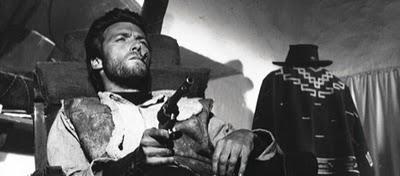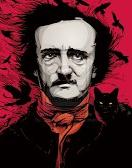
Out of the West
Clint Eastwood’s shifting landscape.
by David Denby
On a beautiful day in Wyoming, in 1880, three men gather on a slight rise behind some rocks, ready to do a bit of killing. Two of them—William Munny (Clint Eastwood) and Ned Logan (Morgan Freeman)—are retired professional assassins, disgusted with their past but broke and therefore willing to shoot a couple of cowhands, unknown to either of them, for cash. The third is the excitable “Schofield Kid” (Jaimz Woolvett), who has read Western dime fiction all his life and is hot to plug someone—pretty much anyone will do. Logan is the best shot, and he raises his Spencer rifle, aiming at one of the men, who are rounding up cattle with some others below. But, after hitting the man’s horse, Logan can’t pull the trigger again; he just can’t kill anymore. As the Schofield Kid loudly complains that no one’s dead yet, Munny takes the rifle and mortally wounds the cowhand, who howls so persistently for water that Munny shouts at his companions, “Will you give him a drink of water, for Christ’s sake? We ain’t gonna shoot.”
The scene, which appears more than halfway through Clint Eastwood’s 1992 Western, “Unforgiven,” is excruciatingly long—nearly five minutes—and, watching it for the first time, you sense almost immediately that the episode is momentous. The awkwardly insistent realism has a cleansing force: at least for that moment, ninety years of efficient movie violence—central to the Western and police genres—falls away. Old myths dissolve into the messy stupidity of life, which, as rendered by Eastwood, becomes the most challenging kind of art. It’s idiotic to kill a stranger for money, and, not only that, it’s hard. Particularly hard on the stranger, but hard on you, too. The Schofield Kid, it turns out, gets to shoot the other cowhand a bit later, as the guy is sitting in the crapper. But, afterward, the Kid is sickened and scared. Everything about the two killings feels wrong, which is all the more surprising since the creator of this sobering spectacle is an actor-director who became famous playing men who killed without trouble, and sometimes with pleasure.
Being underestimated is, for some people, a misfortune. For Eastwood, it became a weapon. Certainly, no one meeting him in his twenties, before his movie career began, would have seen much more than a good-looking Californian who loved beer, women, cars, and noodling at the piano—a fun guy to hang out with. Since those unprepossessing days, he has done the following: starred in a hit TV show, “Rawhide”; appeared in more than fifty movies and directed thirty-one, often acting, directing, and producing at the same time; added several menacingly ironic locutions to the language, such as “Make my day,” which Ronald Reagan quoted in the face of a congressional movement to raise taxes; become a kind of mythic-heroic-redemptive figure, interacting with public desire in a way that no actor has done since John Wayne; served as the mayor of Carmel; won four Oscars and received many other awards, including a hug from Nicolas Sarkozy while becoming commander of the Légion d’Honneur, last November. Those who were skeptical of Eastwood forty years ago (I’m one of them) have long since capitulated, retired, or died. He has outlasted everyone.
Para leer todo el artículo pincha aquí

